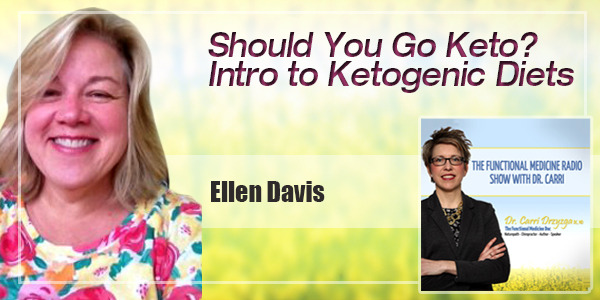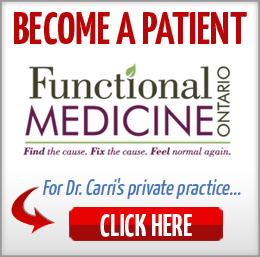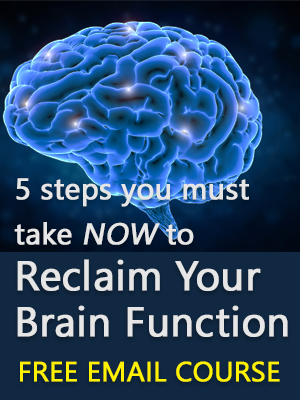Podcast: Play in new window | Download
Subscribe: Apple Podcasts | Android | RSS
In this episode of The Functional Medicine Radio Show, Dr. Carri’s special guest Ellen Davis talks about the positive health effects of a ketogenic diet.
Ellen Davis is the creator of KetogenicDietResource.com, a website showcasing the research on ketogenic diets. She is a member of the American Society of Nutrition and is finishing her Master’s degree in Applied Clinical Nutrition. She recently released the second edition of her ebook titled “Fight Cancer with a Ketogenic Diet”. She is currently writing several books on treating diabetes with a ketogenic diet.
Main Questions Asked:
- What is a ketogenic diet?
- What can a ketogenic diet do for us? How can it switch our metabolism?
- Would a ketogenic diet help with autoimmune disease?
- Can you give us a day in the life on a ketogenic diet?
- Can we jump right into a ketogenic diet, or is it better to take a gradual approach?
- How will we feel on a ketogenic diet?
- Is weight loss typical with a ketogenic diet?
- Once someone starts eating a ketogenic diet, what happens if they deviate from the diet – say they are at an event and eat foods that are not part of the diet?
- What foods are the most important in a ketogenic diet and which foods are avoided?
- What are some of the most common myths regarding the ketogenic diet that you are aware of? Is there any research behind the ketogenic diet?
Key Points made by Ellen:
- A ketogenic diet is low carb, high fat, moderate protein diet. Ketogenic means the body switches from burning sugar for energy to burning fat for energy.
- Most people have chronic elevations of sugar and insulin which eventually leads to insulin resistance. This is mainly from eating too many carbs.
- Ketogenic diets are extremely anti-inflammatory, and very healthy for us – despite what we’ve been told about fat being ‘bad’.
- Most health conditions improve on ketogenic diets, including: diabetes, high blood pressure, heart disease, obesity, MS, Alzheimer’s disease, and Parkinson’s disease.
- Ketogenic diets have been used for the past 40 years as a treatment for epilepsy.
- The ketogenic diet cuts out most of the foods that contribute to autoimmune diseases and helps heal the leaky gut – known as the root cause of all autoimmune disease.
- Ketogenic breakfast example: two eggs, spinach, veggies, two strips of bacon.
- Ketogenic lunch example: green salad with 2-3 ounces of meat, full fat salad dressing, or chicken/tuna salad on cucumber or tomatoes.
- Ketogenic dinner example: appetizer of pate, small piece of fatty fish like salmon, green veggies sautéed in butter.
- If you have a lot of blood sugar problems and insulin resistance you should start into the diet slowly to prevent ‘reactive hypoglycemia’ – feeling like you have low blood sugar, except the blood sugar level is actually normal when you measure it.
- At the start of a ketogenic diet you’ll probably have sugar cravings and feel tired while your body is switching over to fat burning mode. Usually this lasts a week. After this your energy will be great, you’ll feel clear headed, and you’ll probably have little to no pain in your body.
- Most people will lose weight on a ketogenic diet.
- When you ‘cheat’ on the ketogenic diet you’ll switch from fat burning mode back into sugar burning mode. This is not terrible, but it will slow down your healing and will usually take a few days for your body to switch back to fat burning mode once you start eating properly again.
- The foods to eat on a ketogenic diet are: whole meats; green veggies, butter, other types of natural fat (like duck fat, olive oil, coconut oil).
- The difference between a ketogenic diet and the Paleo diet is the ketogenic diet does not allow high starch veggies or dried fruits.
- A high fat ketogenic diet will NOT clog your arteries and give you heart disease.
- Ketosis is NOT dangerous. It’s not the same thing as ‘ketoacidosis’.
- A ketogenic diet is NOT bad for your kidneys and will NOT damage your kidneys.
- You should NOT do a ketogenic diet if you have mitochondrial defects, kidney disease, or serious liver disease.
Resources Mentioned:
Podcast – The Wahls Protocol – How I Beat Multiple Sclerosis
Who should NOT follow a ketogenic diet?
Book – “Fight Cancer with a Ketogenic Diet”
Book – “Conquer Type II Diabetes with a Ketogenic Diet”
Book – Reclaim Your Energy and Feel Normal Again
Thank you for listening! If you enjoyed this podcast, please subscribe and leave a 5 star rating and review on iTunes!








